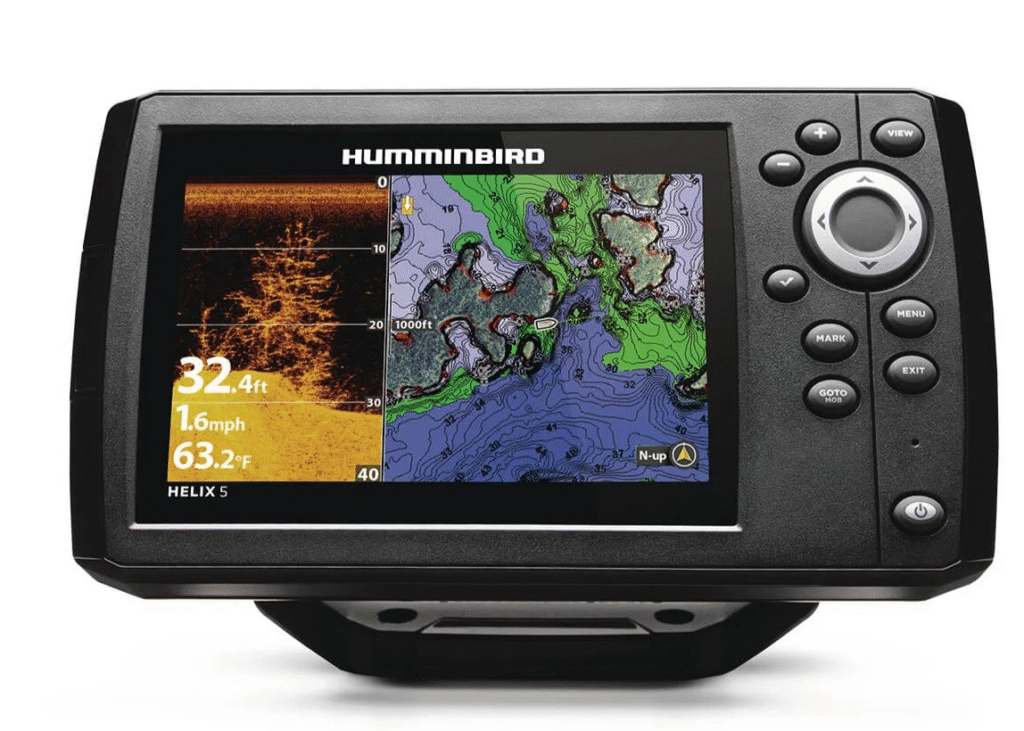The Boater’s Guide to Marine Electronics in Florida and the Caribbean
Marine electronics have come a long way since the first wireless radios at sea. These days, you’ll find everything from advanced chartplotters and fish finders to radar systems. All designed to make time on the water safer and a whole lot more enjoyable.
But with so many choices, it’s easy to feel overwhelmed. What gear actually makes a difference? How do these systems really help you? And which ones matter most when you’re boating in Florida or the Caribbean? This guide breaks down the key electronics that matter most.

Humminbid Helix5
Why Electronics Matter in Tropical Waters
Boating here isn’t like cruising a calm inland lake. You’re dealing with:
- Shallow sandbars and reefs in the Keys and Bahamas
- Unpredictable squalls that sweep across Tampa Bay or St. Lucia with little warning
- Long passages between islands that demand accurate navigation.
That’s why electronics aren’t just “nice extras.” They’re essential safety gear. And when you break it down, each type of electronic has a specific job. Let’s start with one of the biggest challenges in the tropics: navigating reefs and shallow water.
Navigating Coral Reefs and Shallow Waters
Our coral reefs are both beautiful and unforgiving. One wrong move can damage your hull and destroy the fragile ecosystems.
That is where chartplotters shine. Units like the Humminbird Helix5 or the Lowrance Eagle 7 display your exact position and show updated charts, so you know what’s around and beneath you. This will really help you boat more safely through those tricky shallow areas. And help you get that big fish.
Preparing for Sudden Storms and Hurricanes
In the tropics, calm seas can turn threatening in minutes. Have you done the Miami to Bimini route? Or boated near Grenada in hurricane season? The weather can change quickly.
Radar systems, such as the Simrad Halo 200x, are essential. They detect anything inclement, including squalls, long before you see those dark clouds on the horizon. This gives you the best chance to change course or seek shelter before the storm hits.
Safety in Busy Channels and Marinas
Crowded channels and marinas are hotspots for accidents. The U.S. Coast Guard reports that collisions and groundings make up over half of all boating incidents.
That’s why AIS (Automatic Identification System) and VHF radios are non-negotiable. AIS, such as the Furuno FA170, displays nearby boats, their course, and speed. Paired with a reliable fixed-mount VHF, you can see and be seen. And call for help if needed.
Getting the Most Out of GPS and Sonar
Your GPS and Sonar are more electronics crucial when boating. Together, they keep you safe above and below the surface.
Deep vs. Shallow Water Performance
Shallow bays and flats: High-frequency sonar gives crisp detail of the bottom in shallower areas. It’s perfect for spotting rocks, fish, or drop-offs.
Offshore Waters: Low-frequency sonar penetrates deeper, revealing structures and fish hundreds of feet below with less detail.
Modern units like the Simrad NSS4-10 let you switch frequencies or run both at once, so you’re covered inshore and offshore.
Integration with GPS and Chartplotters
When your sonar and GPS share a screen, you don’t waste time juggling displays. If your sonar shows a shallow stretch ahead, your chartplotters can instantly plot a safer route. Combo units bring everything together in one clear view. Saving you space on your vessel and money.\

Protecting Electronics from Heat, Humidity, and Salt
Florida’s blazing sun and the Caribbean’s salt air are brutal on electronics. Without proper care, corrosion and screen damage can set in quickly.
Maintenance Basics
- Rinse salt off screens and keypads with fresh water after every trip.
- Use sun covers or shade to prevent UV fading.
- Keep software updated for performance and bug fixes.
Fighting Corrosion
Salt spray dries into a crust that eats away at wiring and housing. Gear like Blue Sea Systems fuse blocks or waterproof housings adds protection. Regularly greasing plugs and checking wiring goes a long way.
Accessories That Extend Lifespan
- Surge protectors for lightning and dockside spikes.
- Ventilated mounts to reduce heat buildup.
- Sun covers, housings, and even a small cabin dehumidifier to keep electronics dry and cool.
Where to Find the Right Gear
If you’re ready to upgrade your setup, you don’t have to shop around in ten different places. Deep Sea Marine Electronics LLC is a one-stop shop for all the major brands. Garmin, Raymarine, Simrad, Furuno. Additionally, the accessories that keep your gear protected and extend its lifespan.
What makes us worth checking out is the focus. We built with Florida and Caribbean boaters in mind. That means the products we stock actually match the conditions you face. And with a U.S.-based supplier and nationwide shipping, you can get what you need without the back-and-forth.
